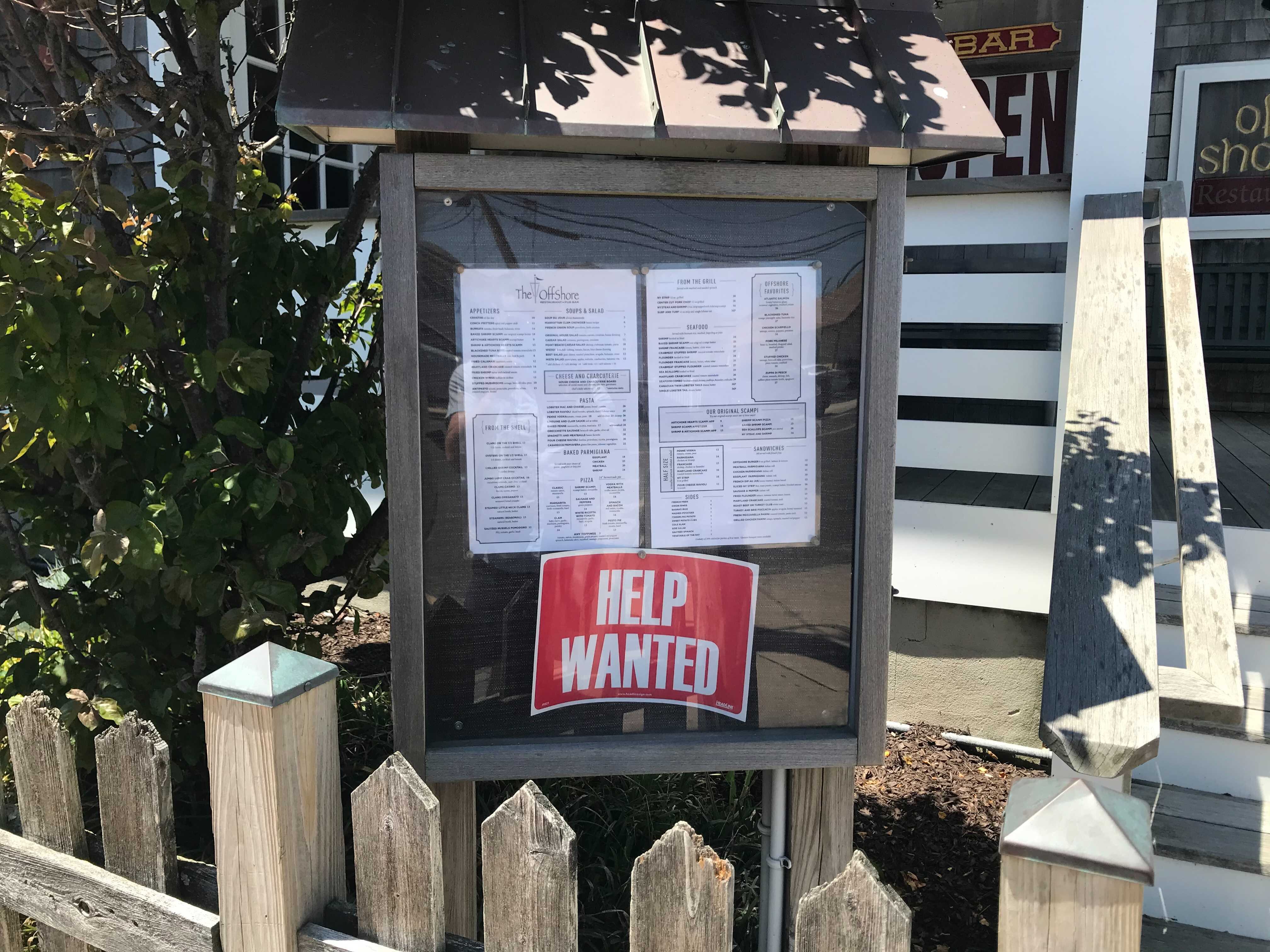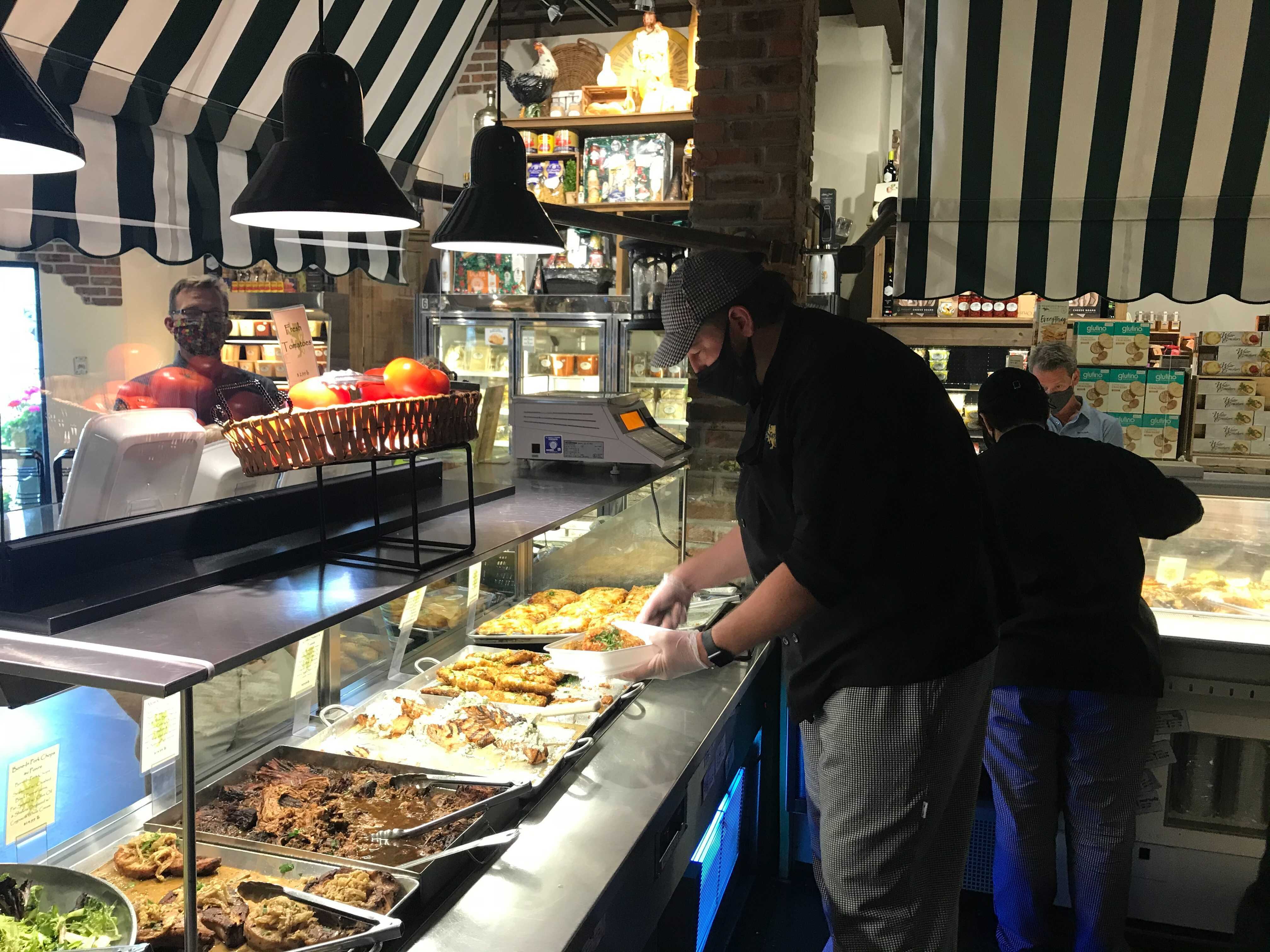Andrea Bohm always planned to someday return to the White Sands. An Indiana transplant, she was happily employed at the oceanfront resort in Point Pleasant Beach, N.J. for five years before getting laid off last October when the private banquets that usually kept the business going during the off-season dried up with the second wave of COVID-19 cases.
Like a lot of people who lost their jobs during the pandemic, Bohm depended on a regular check from the government to help get through the next few months. "If not for the extra unemployment insurance, I wouldn't have made it through the winter," she said.
Now Bohm finds herself in a very different job market. In addition to picking up a full-time position at a marine electronics company, she's back on the White Sand's payroll and running drinks part-time for the hotel's lone bartender.
Bohm's return to the workforce reflects a significant shift in the local economy since the doldrums of last fall. Instead of making painful layoffs, businesses in Point Pleasant Beach are now struggling to fill positions ahead of the summer rush.
This tracks with a broader gap in the U.S. economy, which in April reported job gains of 266,000, well below the one million expected. Some are chalking up the drop to a labor shortage, while others see it as a clear case of wages not being high enough to attract applicants.
Whatever the macroeconomic cause, the impact is being felt viscerally by seasonal businesses revving up for a crucial summer after more than a year of lockdowns.

White Sands, which usually employs roughly 125 people during the summer, is currently stuck at around 40 going into Memorial Day weekend, despite a full-court push from the company to hire more positions.
"I just don't know what to do anymore," said Christina Ranuro, general manager and co-owner of the White Sands Oceanfront Resort & Spa. "I've used every resource that I know to get staff."
She noted that nearby chain businesses such as Wawa and Dunkin' are offering signing bonuses and higher wages, but that she can't afford to pay more than the $15 per hour she's already offering as a starting wage.
Instead she's closing down rooms for occupancy to lighten the load on her staff.
A short walk down the Point Pleasant Beach boardwalk indicates that the problem is widespread. "Help Wanted" signs are posted everywhere: under restaurant menus, flashing across billboards, and scribbled on pieces of paper taped up on the front doors of small businesses.
"Every day I get calls from business owners ranging from boardwalk operators to motels to the restaurants and provisioning stores, and all of them are really desperate for workers," said Mayor Paul M. Kanitra, who added that he's even struggled to fill municipal positions.
Making matters worse is the fact that this summer — just one year after social distancing orders and business shutdowns made a regular beach season impossible — is shaping up to be one of the busiest in recent memory, as newly-vaccinated vacationers flood the beaches and boardwalks.
"We anticipate this could be the biggest summer ever in terms of sheer numbers," Kanitra said.
"Obviously our businesses have suffered tremendously as a result of the pandemic. A lot of businesses had to take out loans to get by. A lot are burdened with debt right now. The importance of this summer cannot be understated in any way, shape or form."
Typical Beach Town, Atypical Job Market
As far as New Jersey beach towns go, Point Pleasant Beach covers all the bases: family-friendly amenities such as a boardwalk, amusement park, arcades, and mini-golf courses, as well as more adult-oriented attractions such as bars, nightclubs, and higher-end restaurants.
It's also typical in that it relies heavily on seasonal workers to carry it through the summer months, and this year, those workers simply aren't showing up — at least not enough of them.
"It's been nearly impossible, especially with the volume that we're going to be doing this summer," George Fusco, executive chef at Lido's Cafe, which is attached to White Sands.
"So far, most of our hires have been high school students."
The manager at Lido's added that no one over 18 has applied for a job this season.
The situation has forced the restaurant to streamline its model, such as moving to a buffet-style setup rather than table service, so that a handful of workers can run the whole operation.

Other restaurateurs noted that high school students have been essential to staying in business, but their limited schedules have made it difficult to maintain regular operations. Fusco added that he'd likely have to raise the tipped wage to $12 an hour in the coming month.
Most business owners point to expanded unemployment insurance, which they argue is paying out too much money and discouraging workers from reentering the job market.
"People aren't dumb," Ranuro of White Sands said. "They're going to take the summer off and enjoy their life."
Some workers have internalized this narrative as well, even as they continue working themselves.
"Not many people are out looking for jobs, because of unemployment [benefits]," said Violeta Perez, 17, a counter attendant at Jenkinson's Pavilion, an arcade on the boardwalk. "Why would you go and find a job if you can easily collect [unemployment] with no issues?"
A recent survey from the Federal Reserve Bank of San Francisco, however, showed that the additional $300 in weekly emergency benefits had only a "small" effect on recipient's decision to take jobs, undercutting an argument taken up by Republicans and business interests alike that the supplementary UI is hampering the economic recovery.
Indeed, Jenkinson's Boardwalk, the largest employer in Point Pleasant Beach and operator of several arcades, restaurants, an amusement park, and a mile-long stretch of beach, has struggled to fill upwards of 300 positions for multiple reasons outside of worker willingness.
One is that the federal Summer Work Travel program, which provides short-term visas to people around the world seeking employment in the U.S., has slowed to a trickle due to international travel restrictions related to COVID. This has led small businesses to begin lobbying the Biden administration to resume the program as usual.
Toby Wolf, director of marketing for Jenkinson's Boardwalk, said that usually about 10 percent of the company's seasonal average of about 1,200 total employees come from the program. This year, only a handful actually made it to the U.S. for hiring.
Ranuro likewise said just one out of an expected 12 travel workers are currently hired.
When the Money's Good
As Mayor Kanitra noted, if the extra unemployment benefits are the problem, then there is little local governments or small business owners can do to stop it.
Yet that hasn't stopped many business owners from doing exactly what some economists say is necessary to bring back the workers: raise wages.
Joe Introna, owner of Joe Leone's Italian Specialities & Catering in downtown Point Pleasant Beach, several blocks from the boardwalk, said he's pushed up the starting wage to $14-15 an hour, but that he can't go much further than that.
"Everyone's been competing against each other because they're so desperate for help," he said. "They're advertising $16,$17, $18 an hour. I can't compete with that. There's only a certain amount of margin."
He added that low-skilled employees are jumping ship for other employers, noting that four team members have left in the last three weeks.
"I actually ordered a mascot lion, and I'm going to be paying a friend of my son's to go out front of the store and jump around with a sign that says hiring," he said.
The role of wages in attracting workers is evident in the higher-paying serving and bartending positions at Point Pleasant Beach's popular bars and restaurants.
Briana, a 21-year-old server at Cantina on the boardwalk, who did not want to share her last name due to privacy concerns, said the restaurant was "pretty stacked up" in terms of workers, largely because the pay was good. "We make too much money," she said.
At Martell's Tiki Bar nearby, assistant general manager Mike Hull noted that serving positions were all filled up. It was the non-tipped security and kitchen staff positions that were hard to fill, even though the restaurant is offering $15 per hour or more.
"We could probably hire 20 security guards tomorrow at $15 an hour with overtime available," he said, but not enough candidates have been applying.
However, the decision to take a job isn't always reducible to wage. Bohm said that she was making more on unemployment than her current full-time job, but that unemployment, of course, didn't come with health insurance or other benefits and would eventually run-out.
"I'm basically taking a $200 pay cut to come to work, but the benefits are worth their weight in gold," she said.
She also pointed out that the unemployment supplement was extremely helpful in allowing her to find a job that she enjoys. Put another way, it gave her leverage in the job market.
"It makes it a little bit easier for people to be picky and choosy about what job they go back to," she said.



